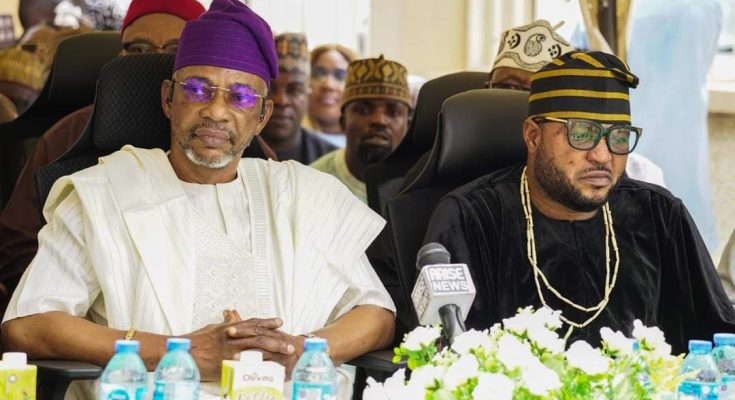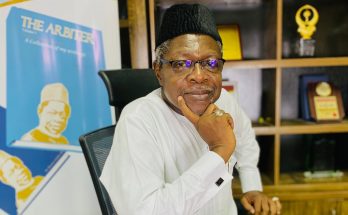With the infusion of new vigour spurred by progressive ideals, incumbent Chief Commissioner of the Public Complaints Commission (PCC), Hon Abimbola Ayo-Yusuf is ably projecting what President Bola Ahmed Tinubu and patriotic, people-focused commitment stand for.
For the first time in its history, Nigeria’s Ombudsman, the PCC, under the leadership of Hon Abimbola Ayo-Yusuf, was granted election observer status during the election that ushered in the Renewed Hope administration of President Tinubu.
This people-centred proactive involvement in deepening our democracy marked a significant milestone, establishing the PCC as a vital stakeholder, not just in electoral matters but also in all that concerns the present and the future of Nigerian citizens in an evolving democratic space.
Established on October 16, 1975 by the Murtala-Obasanjo military regime on the recommendation of the Udoji Panel of Inquiry vested with the powers to investigate and resolve any form of injustice arising from administrative errors, abuse of power and office by government officials or private establishments in Nigeria, the Commission stands as a sentinel against administrative excesses and legal abuses, serving as a vital organ of the Nigerian government.
It is dedicated to addressing grievances brought forth by citizens or residents who have suffered administrative injustices. Championing social justice, the PCC offers a robust avenue for individuals seeking redress from the errors, omissions, or abuses perpetrated by government officials or private entities; this institution ensures that Nigerians, and all residents, have a reliable mechanism to challenge and rectify bureaucratic wrongs.
Beyond actualising redress, the PCC under Hon Abimbola Ayo-Yusuf now plays an increasingly crucial role in enhancing public administration as it meticulously reviews and recommends improvements to laws, procedures, practices, rules, regulations, and the standard conduct of officials, as outlined in the ACT, CAP 37 LFN 2004.
At its core, the PCC’s primary function is to conduct unbiased investigations on behalf of those wronged by government actions or inactions, or by private companies and the Commission operates independently of government bureaucracy, wielding significant powers to ensure confidentiality and access to all pertinent government information.
As a bulwark against excesses in high places, it compels the production of documents necessary for thorough investigations and enforces compliance to secure essential information. This autonomy and authority underpin the PCC’s commitment to justice and accountability in the process of quiet but effective renewal of citizens’ hope in Nigeria.
Since its establishment, the PCC has quietly investigated and successfully handled hundreds of thousands of complaints that have been brought before it by Nigerians and residents in Nigeria.
Living up to its vision statement of restoring dignity of man through the enthronement of rule of law and the protection of the individual and organisation against administrative injustice, the PCC has since inception been promoting effective and efficient services that is responsible to the needs of the citizenry through proactive investigation and resolution of complaints against various levels of government: federal, state and local governments, including public corporations, private sector organisations and their officials.
Its core mandate, including to investigate and conduct research in Ministries, Departments and Agencies (MDAs), private companies and officials of these bodies; investigate administrative procedures of any court of law in Nigeria; report crimes in the course or after investigation; report any erring officer for disciplinary action; report, interpret policies of government and advise government and companies; as well as to make public, reports and after investigation; have access to all information and make recommendation, especially after proactive investigation.
PCC has no doubt given and has continued to give Nigerians better and qualitative service delivery. This is even more so under the President Tinubu Renewed Hope Agenda.
As the Chief Commissioner, also known as the Chief Ombudsman, Hon Abimbola Ayo-Yusuf is the lead management member of the PCC. He came in behind eight predecessors led by foremost Nigerian Politician, Diplomat and Elder Statesman, late Alhaji Yusuf Matiama Sule, Masanin Kano, who became PCC’s pioneer Federal Commissioner of Public Complaints in 1976 and served until 1979.
His successor, Mr. F.H. Brisibe, was in the office between 1979 and 1981; while Canon H.O Mohammed succeeded him from 1981 and 1987, followed by Hon. Justice J.H Dandaura, who led PCC between 1987 and 1993.
In 1993, Mr. Jackson Edokpa, served as the Chief Commissioner and left office in 1999; just as Hon. Justice George Uloko was at the helm of affairs from 2012 to 2015 when he handed over to Chief Emmanuel Ogbile, who occupied the office until 2018.
In 2018, Hon. Chille Igbawua, who succeeded him, served as the Chief Commissioner of the PCC until 2021 when Hon. Abimbola Ayo-Yusuf, took over the mantle of leadership.
Leadership for change
Hon Abimbola Ayo-Yusuf, the 9th Chief Commissioner of the PCC, exemplifies Harry S. Truman’s notion that “men make history.” Supported by forward-thinking Commissioners and Directors, Ayo-Yusuf has propelled the PCC to new heights despite budgetary constraints.
Under his leadership, the PCC received 34,000 complaints between July 2021 and October 2022, resolving 13,000 of them. By September 2023, they handled 258,780 complaints, successfully resolving 170,000.
Ayo-Yusuf prioritises staff training, aligning with Peter Drucker’s belief in lifelong learning. This focus has enhanced staff productivity and service delivery, fostering a culture of innovation and excellence. Additionally, his efforts in staff welfare have created a supportive working environment, further boosting morale and efficiency.
Engagement with key stakeholders and the establishment of the Complaints Lounge and Call Centre have brought the PCC closer to the public.
His renovation of the PCC headquarters and purchase of a new building for the FCT office demonstrate his commitment to improving work conditions and accessibility.
Ayo-Yusuf’s tenure also includes launching the PCC Football Club to promote wellness and discover talent within the Commission. His leadership aligns with the Tinubu-led administration’s vision of Renewed Hope leaving a legacy of passion-driven progress and transformative change.
Ekpendu writes in from Abuja




